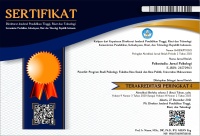Hubungan Antara Komitmen Organisasi dan Keadilan Organisasi Dengan Intensi Turn Over
Abstract
Keywords
Full Text:
PDFReferences
Raka., (2003). Pidato Ilmiah Sidang Terbuka: Peringatan Dies Natalis ke 44 Institut Teknologi Bandung. Diakses tanggal 23 Oktober 2003. Dalam http://www.itb.ac.id/2003/papers.).
Brough, Paula, Frame & Rachael. 2004. Predicting Police Job Satisfaction and Turnover Intentions: The role of social support and police organizational variables. New Zealand Psychological Society.
Camp. Scott D., (1993). Assessing the Effects of Organizational Commitment and Job Satisfaction on Turnover: An Event History Approach.The Prison Journal. 74:3:279-305.
Colquitt, J.A., (2003). On the Dimensionality of Organizational Justice: A Construct Validation of a Measure. Journal of Applied Psychology. 86, (3), 386-400.
Colquitt, J.A., Conlon, D.E., Wesson, M.J., Porter, C.O.L.H., & Yee Ng, K. (2001). Justice at the Millennium: A Meta-Analytic Review of 25 Years of Organizational Justice Research. Journal of Applied Psychology. 86, (3), 425-445.
Elovainio, M., Kivima¨ ki, M., & Helkama, K. (2001). Organizational justice evaluations, job control, & occupational strain. Journal of Applied Psychology, 86, 418–424.
Huselid, Mark A & Day. Nancy. (1991). Organizational commitment, job involvement and turnover a substantive and methodological analysis. Journal of Apllied Psychology. Vol 76. No.3 380-391.
Joo, Baek-Kyoo., & Park, Sunyoung., (2009). Career satisfaction, organizational commitment, and turnover intention. Leadership & Organization Development Journal.Vol. 31 No. 6, pp. 482-500
Khatri. N, Budhar. P & Fern, C.T. (1998). Employe Turnover: Bad Attitude or Poor Management? Singapore. Nanyang Business School. Retrieved from http://www.ntu.edu.sg/nbs/sabre/working_papers/12-99.pdf
Konovsky, M.A. (2000). Understanding procedural justice & its impact on business organizations. Journal of Management, 26, 489–511.from http://www.accessmylibrary.com/article-1G1-65307156/understanding-procedural-justice-and.html. diakses 15 juli 2011.
Kumar, K. & Gupta, G. (2009). Perceived Organizational Justice, Job Satisfaction and Turnover Intentions: A Co-Relational Study. Gujarat Journal of Psychology. 1. 25-26: Florida International University (FIU).
Kreitner, R. & Kinicki, A. (2004). Organizational Behavior. 6th.ed. McGraw Hill. Companies. Inc.
Lum, L.J. Kervin, K. Clack, F. Reid & W. sirola (1998). Explaining Nursing Turnover Intention: Job Satisfaction, Pay satisfaction, or Organizational Commitment? Journal of organizational Behavior. 19,305-320.
Mathieu, J.E. &Zajac, M.D. (1998). A Review and Meta-analysis of The Antecedent, Correlates, and Consequences of Organizational Commitment, Psychology Bulletin. 108, 171-194.
Parker, R.J., & Kohlmeyer, J.M. (2005). Organizational justice and turnover in public accountant firms: a research note. Accounting, Organizations, and Society 30, 357-369.
Ponnu, C. H. & Chuah, C.C. (2010). Organizational Commitment, Organizational Justice and Employee Turnover in Malaysia. African Journal of Business Management. 4, (13), pp. 2676-2692: University of Malaya, Kuala Lumpur, Malaysia.
Robbins, S.P. (2003). Perilaku Organisasi: Konsep, Kontroversi, Aplikasi, Edisi Bahasa Indonesi, Jilid 1 dan 2 Jakarta: PT. Prenhalindo.
Sanders, Karin., Nauta, Aukje., &Koster, Ferry. (2003). Commitment to The Organization: The Influence of Satisfaction with Type and Extent of The Labor Contract. Outcome of The Research Program “Solidarity at Work” which is financed by PBB-program of the NWO. Human Resources Science. University of Tilburg, Netherlands.
Setyawati. Nining (2005) Hubungan antara keadilan organisasi dan komitmen dengan perilaku berorientasi pelanggan pada karyawan Rumah Sakit Umum Pusat Dr. Soeradji Tirtonegoro Klaten Jawa Tengah. Tesis. UGM. Tidak diterbitkan.
DOI: http://dx.doi.org/10.30872/psikostudia.v3i1.2243
Refbacks
- There are currently no refbacks.
Copyright (c) 2019 Psikostudia : Jurnal Psikologi

This work is licensed under a Creative Commons Attribution-ShareAlike 4.0 International License.
Indexing by :
_________________________________________
PSIKOSTUDIA: Jurnal Psikologi Published by Faculty of Social and Political Siences, University of Mulawarman, Samarinda, East Kalimantan and This work is licensed under a Creative Commons Attribution-ShareAlike 4.0 International License.
_________________________________________
PSIKOSTUDIA: Jurnal Psikologi
Department of Psychology
Faculty of Social and Political Siences, University of Mulawarman
Jl. Muara Muntai Kampus Gn. Kelua Samarinda 75411
Phone: +62 813 35350368
E-Mail: psikostudia@fisip.unmul.ac.id




















